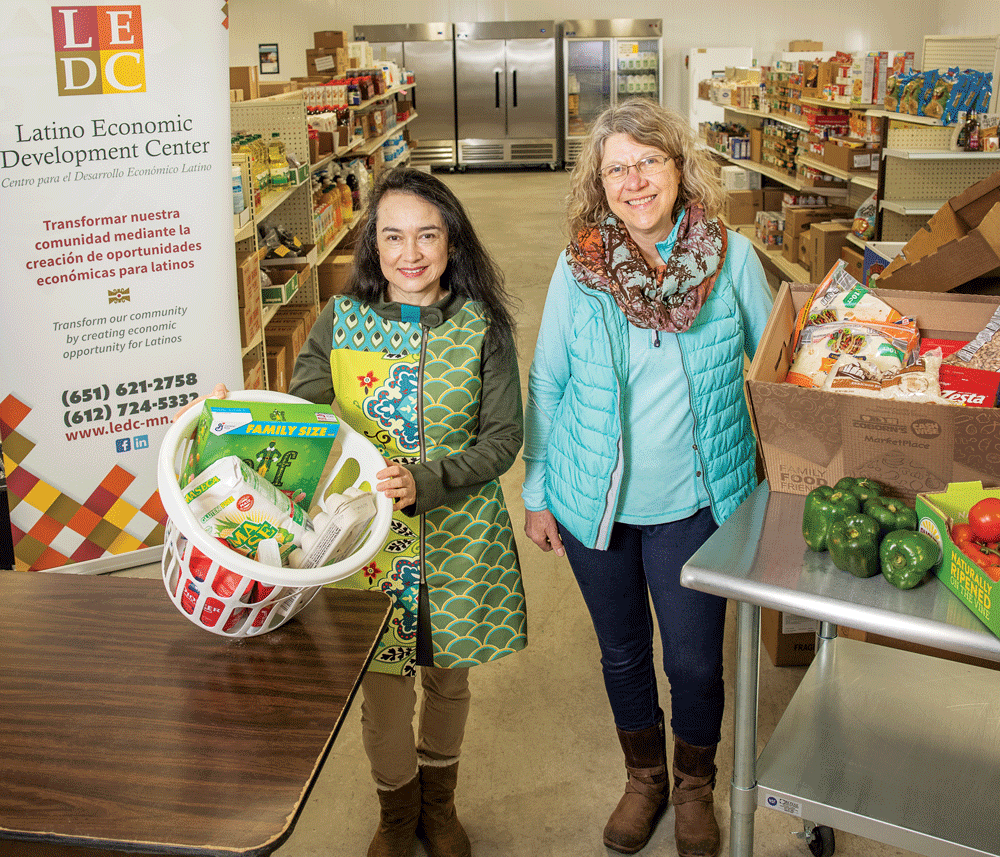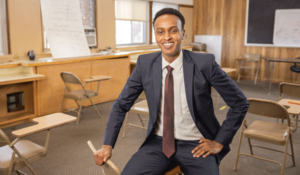Serving the Underserved

The pandemic showed us that too many families in Central Minnesota live without an adequate safety net. Here’s what the Initiative Foundation is doing to help.
By Lisa Meyers McClintick
This story originally appeared on the Initiative Foundation website and in IQ Magazine. It is republished with permission.
When COVID-19 slammed Central Minnesota in early 2020, it swept through meat-packing plants and large-scale dairy operations and affected families who were least able to buffer the tsunami of hardship and trouble unleashed by the pandemic. Many of these families were New Americans.
Multigenerational families in apartments and small houses had no space to quarantine when daily positive cases rose into the hundreds. Workers were forced to take unpaid time to care for themselves or family members who were sick. Those who were fortunate enough to still have jobs had to go to work despite the risk of COVID-19 exposure because they didn’t want to lose rent money. Personal Protective Equipment was scarce and test results often took more than a week. Compounding the stress, distance learning raised the need for reliable Internet service, child care, homework help and meals that had previously been available through schools.
“The central lesson from this whole pandemic year has been the underscoring of how many people in Central Minnesota are highly vulnerable,” said Don Hickman, the Initiative Foundation’s vice president for community and workforce development. “It’s really shocking how many people had little or no safety net.”

“There has been quite a bit of suffering,” agreed Shirwa Adan, executive director for the St. Cloud-based Central Minnesota Community Empowerment Organization, which assists refugee and immigrant communities. He also works with the Initiative Foundation to find ways to support the region’s East African community. “A lot of the [community] disparity and needs have been amplified by COVID-19,” he said.
FEEDING THE SOUL
Since August 2020, Adan and Mónica Segura-Schwartz, business development associate at the Latino Economic Development Center, have collaborated with the Initiative Foundation as bilingual relief coordinators whose work is funded through a Center for Disaster Philanthropy grant. They are working to find better ways to meet the unique and often overlooked needs of newer Americans.
That includes providing culturally appropriate food, which can be an especially important emotional comfort in stressful times. “Food is more than feeding the hungry,” said Segura-Schwartz. “It’s also feeding the soul.”
Immigrant families often make much of their food from scratch, showing love by using recipes passed down from parents and grandparents. This vital connection made an impact on Candy Freeman, who coordinates the Melrose Food Shelf. While picking peppers in the community garden with a Latinx volunteer, the woman told Freeman that her mother had used those same peppers in recipes to feed her family.
Some families also struggled to provide meals for their children when their school-aged kids could no longer eat breakfast and lunch at school, due to the shift to distance learning. “A meal became really, really important for them,” said Segura-Schwartz. Last spring, the Melrose Knights of Columbus left food relief baskets on the doorsteps of families who were quarantined or recovering from the coronavirus. With the help of a $35,000 grant from the Greater Minneapolis Council of Churches, the Melrose Food Shelf assembled 100 Christmas baskets with dried beans, bulk flours, rice, cooking oil and gift cards from a local grocer selling fresh produce and meat. The Initiative Foundation also offered a $5,000 challenge grant to raise money for winter coats and boots for Latino kids and adults who worked outdoors on area farms and needed cold-weather gear.
For East Africans, Adan helped set up a partnership with local African grocery stores so that families in need could shop for flatbread, spices, tea and Halal meat, which is from animals raised and blessed by a Muslim, who slaughters them by hand. The initiative connected more than 500 families with culturally appropriate food and supported the region’s small businesses.
DISTANCE LEARNINGS
Perhaps the biggest challenge of the pandemic has been the transition of thousands of students to distance learning. Children of essential workers often were left at home without supervising adults. Many families did not have reliable Internet service for live-streamed lessons.
Grants helped purchase mobile wireless hot spots for families in remote areas of the region. The Islamic Center of St. Cloud, with additional funding from the Morgan Family Foundation and United Way of Central Minnesota, was one of several community centers set up as Internet hubs in the region. The center can serve more than 2,000 children, rotated in and out during the day. There’s also an afterschool program.
Families who were infected by COVID-19 lost household income when they had to quarantine. But many people lost jobs, and even careers, when businesses shuttered temporarily or permanently.
A multi-agency effort that included support from Stearns County and federal funding was able to assist close to 500 St. Cloud new American families by providing food, paying utility bills and covering rent until the end of 2020. “The community got the help they needed,” Adan said. “That was really a big relief for those families. They were facing eviction.”
With technology evolving and education adapting quickly, community leaders are finding new ways to offer resources to the region’s most vulnerable communities.
Last fall, Pine Technical and Community College received $150,000 in federal CARES Act funds—distributed by the Initiative Foundation on behalf of Pine County—to create fast-track career programs in welding, manufacturing, nursing and other high-demand vocations. More recently, the Foundation awarded Pine Tech another $10,000 to offer an online class for the Childhood Development certificate—the entry-level credential for child care providers. The virtual program is delivered nights and weekends (in English and Spanish) with support available for tuition, books and other expenses.
“All of us want the dignity of work and the ability to feed our families,” Hickman said. “The pandemic has taken that from many households. We want to make sure they have the opportunity to recover that.”
While there are few silver linings to the economic, educational and emotional ravages of the pandemic, it did motivate workers to organize across cultures to advocate for safer working conditions at farms and meat-packing plants. That might mean more sanitizing areas, more space between workers and protective equipment and clothing.
Adan said he appreciated the many ways he, Segura-Schwartz, the Initiative Foundation and nonprofits throughout the region sought to share ideas and resources and to look for better ways to serve communities and people with the greatest needs.
“Crisis brings communities together,” he said, “and that has been the biggest opportunity.”